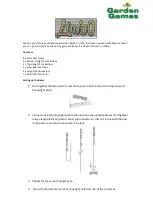
ENCLOSURE SAFETY INFORMATION
NEED FOR TRAMPOLINE ENCLOSURE SAFETY
A trampoline enclosure is a recreational product.
The information on this page and on pages 8-9 identify important safety precautions. The precautions are not all-
inclusive, because an enclosure can be used in ways that this manual cannot cover completely.
To prevent pinches and cuts during enclosure use, a frame pad must be installed on the trampoline. (See the trampo-
line manufacturer’s instructions.) The frame pad must be placed on the trampoline before the enclosure is erected.
The frame pad reduces the chance of injury from accidental contact with the springs and frame.
USING THE ENCLOSURE SAFELY
Adult Supervision of Children
Children using a trampoline with a trampoline enclosure must be supervised by adults. Young children must be
supervised constantly. Adults must pay particular attention to:
•
things that children bring into the enclosure.
•
children’s activities inside the enclosure.
•
conditions inside the enclosure while children are using it.
•
the way children enter and exit the enclosure.
Additional details of safety enclosure use are described below.
Electrocution Hazard Associated with the Metal Frame of the Trampoline and Enclosure
The trampoline and enclosure frames are made of galvanized steel. They are not grounded and will conduct electricity.
For this reason, an electrocution hazard exists. No lights, electric heaters, extension cords, or household electrical appli-
ances are to be permitted in or on the trampoline or enclosure at any time.
Hazards Associated with Entering and Leaving the Trampoline Enclosure
A trampoline enclosure installed on a trampoline is raised off the ground. The height of the enclosure increases the
risk of a fall when a jumper is entering or leaving the enclosure. Young children, especially, may have difficulty
entering and exiting the enclosure. To reduce the risk of falling, always help young children to get into and out of
the enclosure.
Enter and exit the trampoline enclosure only through the door of the enclosure (the opening in the netting walls).
The trampoline mat (bed) and the netting walls of the enclosure are separate pieces. No jumper, especially young
children, should ever leave the enclosure by going out between the mat and the netting walls. Trying to get out in
this way creates a risk of choking from being caught between the trampoline frame and the netting walls.
Darkness increases the chances of a fall when a jumper is entering or leaving the enclosure. Do not use the trampo-
line unless there is plenty of lighting provided.
Hazards Associated with Animals, Sharp or Breakable Objects
To avoid damage to the trampoline enclosure and the trampoline, do not allow pets or other animals inside of the
enclosure. The claws and teeth of animals can damage the netting. Do not jump on the trampoline while holding or
wearing a sharp or breakable object.
7








































